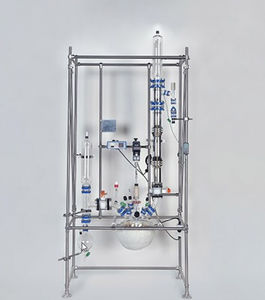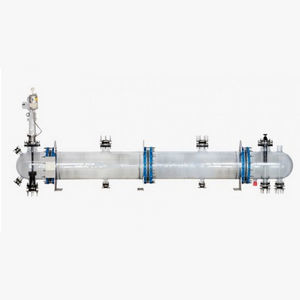

- Products
- Catalogs
- News & Trends
- Exhibitions
Nutsche filtration unit for liquidslaboratory

Add to favorites
Compare this product
Characteristics
- Technology
- Nutsche
- Designed for
- for liquids
- Other characteristics
- laboratory
Description
Filtration is a process used for separating or purifying substances, usually a suspension. It is one of the mechanical separation processes that is based exclusively on physics.
The mixture to be separated runs through a filter, which consists of, for example, paper or textile fabric, PTFE, or metal. All filter materials represent a resistance to all particles of the mixture to be separated.
Contrary to widespread belief, not only particles larger than the pore size of the filter are retained - this screening effect is only one its many mechanisms. Other mechanisms include particle inertia, diffusion effects, electrostatics, or barrier effect. Therefore, particles that are far smaller than the pore size of the filter are also separated.
In Nutsche filters, a layer, the filter cake, forms from the retained particles after a certain amount of time. Once a sufficiently thick filter cake has built up, complete separation of the particles is usually achieved, but the flow resistance of the filter also increases significantly. Depending on the design of the filter, the filter cake or the retained solids must be removed from time to time, for example, by stirring.
Our highly experienced experts can assist the customer with the design, construction, and commissioning of filtration equipment to ensure the most appropriate solutions for the pharmaceutical industry.
VIDEO
Related Searches
- Liquid separator filter
- Filter for industrial applications
- Stainless steel separator filter
- Filtration system
- Liquid filtration system
- Disc filter
- Vacuum filtration system
- Centrifugal separator filter
- Liquid filter-dryer
- Sludge treatment filter
- Laboratory filtration system
- Nutsche filter-dryer
- Pressure filter-dryer
- Stainless steel filter-dryer
- Separation filter-dryer
- Plate filter-dryer
*Prices are pre-tax. They exclude delivery charges and customs duties and do not include additional charges for installation or activation options. Prices are indicative only and may vary by country, with changes to the cost of raw materials and exchange rates.




